Severe Weather Survivors: Synthetic Slate and Shake - PODCAST TRANSCRIPT
November 26, 2023 at 12:00 p.m.Editor's note: The following is the transcript of a live interview with Todd Knight of Dynasty Roofing, Cody Bates from Florida Specialty Roofing and Thomas Ice of Storm King. You can Read the transcript, Listen to the podcast or Watch the webinar.
Heidi Ellsworth: Hello, and welcome to RoofersCoffeeShops, RLW. My name is Heidi Ellsworth. We're very excited that you're here today and we're going to be talking about severe weather survivors. Yes, that would be roof survivors who have used synthetic slate and shake, but we're really going to be talking about severe weather and what to do, working with your homeowners suggestions, and just some really interesting information from different parts of the country. So excited to have you all here today.
A few housekeeping. This is being recorded and will be available on demand within the next 24 hours. We do have our chat open. So hello Jim. Thank you. Please let us know who you are and where you're from, what kind of business you have as we go along. We will be taking questions at the end of the hour, but put them on into the chat and I'll hold them till then. And please share this out with everyone. This is the kind of information that can help your business, really help you understand roofing around the country. So we're very excited about that and excited to have you all here. So let's get started.
I am really excited to be introducing this esteemed panel of roofing contractors from across the country. First of all, I would like to introduce Todd Knight. Todd, welcome to the show.
Todd Knight: Thanks, Heidi. So glad to be here.
Heidi Ellsworth: Thank you. I'm thrilled to have you. So please introduce yourself and tell us about your business.
Todd Knight: Yeah. We just celebrated our 25th year in Fort Worth, Texas. So we serve the whole Dallas-Fort Worth metroplex, and residential and commercial business. We're a boutique roofing company. We focus on high-end residential homes, and we're just very fortunate to have some great crews and a great team that make a good company,
Heidi Ellsworth: A great company, and a lot of great information coming out of Texas. So I'm excited to hear all about that. Thank you so much for being here today. Next I'd like to introduce Cody Bates. And Cody, welcome to the show.
Cody Bates: Thanks, Heidi. Appreciate you having me.
Heidi Ellsworth: So happy to have you here. So please introduce yourself and tell us about your company.
Cody Bates: Yeah, Cody Bates, based out of Central Florida, one of the co-owners of Florida Specialty Roofing. Similar to Todd, we specialize in high-end residential as well as commercial multifamily, specializing in the composite in the tile sector of roofing.
Heidi Ellsworth: That's excellent. Thank you so much. Again, great information that's going to be coming out from Florida. As you can tell, we've hit all the key states and least, but certainly not last. I'd love to introduce Tom Ice. Tom, welcome to the show.
Thomas Ice: Thank you. Thank you for having me.
Heidi Ellsworth: Thank you. And please introduce yourself and tell us about your company out of Colorado.
Thomas Ice: Sure. Tom Ice. I've been roofing in the mountains of Colorado for 25 years. I've been with Storm King Roofing for a few years. They're a five-year-old company catering to the resort communities in the mountains of Colorado. We do a lot of synthetic shake products, flat roofing, commercial and high-end residential.
Heidi Ellsworth: Excellent. Well, I tell you what, as everyone can tell, we have brought the key weather states to have this conversation with top contractors. So we're going to have just a little bit of an overview of what you all are dealing with in your different states. So let's start with you, Todd. Just give us a feel for Texas and some of the extremes.
Todd Knight: Yeah. Dallas-Fort Worth, particularly in this area, is known as one of the hail capitals of the nation. There's a few of those places around the country, obviously, but DFW has historically been known for lots of hail. We obviously have extreme heats. In fact, we're coming off a historic summer in Texas with 108 to 110 degree days for two to three months without stopping, which then takes us into the fall where we have extreme cold weather as well. And the problem that creates for roofing products is thermal shock around here because of the extreme heat, extreme cold weather. But we have learned that synthetic products have really performed like a champ in these hard weather conditions here in Texas.
Heidi Ellsworth: It's so true. I mean, you really need something that can deal with that, the extreme hot and cold, and not to mention your hail, which we know is big. And speaking of hail and snow and temperatures, we have Colorado. So Tom, please tell us a little bit about your climate, where you're at in some of the extremes.
Thomas Ice: Yeah, so like I said earlier, we're catering to the high-end resort market, so Aspen, Vail, tremendous amounts of snow, ice, ice standing issues. And then on top of that, summer months, we have a wildfire hazard and extreme UV in the high mountains of Colorado during the summer months.
Heidi Ellsworth: Yeah. And being from the mountains of Oregon, we both know wildfire.
Thomas Ice: Yes.
Heidi Ellsworth: Yeah, that's the one we don't like to deal with at all. No. And then clear cross the other side of the country. Cody, talk to us about Florida.
Cody Bates: Yeah, so Florida is everybody's aware, one of the major hurricane states. But other than that, we do go through an extreme rainy season where we're sustaining almost tropical storm winds and rainstorms for multiple months throughout the year. We have to deal with a lot of code requirements, meeting all the demand, we did code, especially as we get towards South Florida, which requires different fastener patterns, different exposure levels, things like that that can make the installations a little bit more time-consuming. Also, hail is becoming more prevalent year after year since we've been down here. Nothing like what Todd gets in Texas, of course, but we do get some pretty good hailstorms a couple of times throughout the year. So the synthetic roofing industry meets a lot of these requirements. Obviously Vinci being Miami-Dade approved, meets all the highway uplift requirements through the additional fasteners that we have to add. And also being hail and impact resistant, synthetics are a really growing industry down here and we're seeing more and more of it getting installed every single year.
Heidi Ellsworth: That is great. That's great. Well, let's dive in a little bit deeper, because we want to have that overview, but really when you're looking at Texas severe weather, Todd, I would love for you to talk about some of the jobs you've had and then all of these extremes that you've had to deal with.
Todd Knight: Obviously hail damage is one thing where roofs will just get wiped out and obviously, they need to be replaced. The other thing we have here is heavy rains as well. And so we'll go from heat and then we'll still have the rains coming in and the roofs will be dried out or suffering with the thermal shock. And when the rains come in, this is when the splitting and the cracking begins in the roofing systems. And one of our projects that are featured here was a house that we did that had an old jumbo wood shingle, jumbo shake roof on it that just was so dry and old and it just couldn't withstand the rains any longer. And so we ended up talking to this customer about considering... They wanted to preserve the look of the wood on their home because of the style of the house. And we began showing them one of the synthetic products that DaVinci has and their shake. And it was a tremendous installation and just the customer was absolutely thrilled because of the authentic look that this synthetic product provided.
Heidi Ellsworth: That's really important too, because a lot of times you can talk about performance products, but if they don't bring the aesthetics or the beauty for home values, for everything, you want that combination of both. When you and I were talking about this project, one of the ones I thought was really interesting was the organic growth and moss, because I'm from Oregon, so I see a lot of moss. I don't think of that in Texas.
Todd Knight: Right. Yeah. We get that because of the humidity around here. And so any place, any lots that have areas that are heavily treed, you're going to find algae growing on the roof or at least algae stains occurring. And so we get a lot of questions from customers about how do I get rid of these algae stains off my roof? But in this particular case, whether there's wood shingles involved, the algae just grows at such a rapid rate that it had taken over about a third of this roof and just the roof had become a sponge once that algae had taken place there.
Heidi Ellsworth: Yeah. And I guess one last question I had too, as we look at this project, obviously there's a lot of cedar shake roofs around this area, but when you compare that to the synthetics and you talked about energy savings and in this project the energy savings going to synthetics, is that all insulation? Or is it just that the cedar shake just couldn't perform anymore?
Todd Knight: Yeah, it depends on how the roof is breathing. And so typically cedar shakes breathe pretty well, but once they become covered in algae, they lose all their thermal efficiency. And so this customer was particularly inquisitive about keeping thermal values in their house as low as possible. And so we were able to show them this DaVinci product, the synthetic product, would maintain that form. And they have been thrilled. We had 108 summers around here, they said their house was as cool as it's ever been.
Heidi Ellsworth: That's great. That's great. You don't always think about all these different angles that really play, especially for the homeowners as they're looking at that. I think it's somewhat the same too. When you really look at going to Colorado. And Tom, when you're looking at dealing with the snow loads and everything. Talk to us about that.
Thomas Ice: Yeah, so big snow loads. This house here is in Snowmass Village, Colorado, tremendous amounts of snow along with Aspen. We've got to concentrate on ice damming, snow retention, keeping the snow on the roof to keep it on there from sliding off and injuring somebody or damaging property. And along with that comes the snow guards, snow fence, heat tape, gutters, downspouts and ensuring it's vented properly. Through the '70s, '80s and '90s, a tremendous amount of cedar shakes were installed on these large custom homes. And right now, very few communities will allow them due to the wildfire hazard. So the synthetic shakes, a Class A fire rated synthetic shake is the way most of these customers want to go to preserve that look in the wood shake.
Heidi Ellsworth: When you think about all the wood shake roofs in Colorado, especially up in the mountains, and there's a real need. Sometimes it's not just that I want that roof to look like shake, I want it to be beautiful. But there's also HOA and there's design communities, right?
Thomas Ice: Yeah. And also insurance. Many insurance companies are canceling policies with homeowners who continue to leave the wood on their roofs. So that's prompting a lot of people to get roof replacements with either Class A metal or Class A synthetic shape.
Heidi Ellsworth: Well, I think it's also interesting. Actually, DaVinci, last year we had a great webinar RLW on snow retention, and that is definitely something you are working with all the time, snow guards. But we were just, before we started this webinar, talking about snow removal, that there's so much. And so the walkability of these roofs become very important. Talk a little bit about that.
Thomas Ice: Sure. The guys appreciate the walkability of the DaVinci shakes when they're up there installing them or removing the snow and ice from them. And then the snow retention also helps with that. Helps prevent you from sliding off the roof while you're up there removing the snow.
Heidi Ellsworth: Yeah. Or all the grandma's roses down below.
Thomas Ice: Exactly. Yeah. A big part of our work during the winter months is just removing snow from roofs. And removing snow so we can continue to install roofing.
Heidi Ellsworth: So true. Wow. I would recommend to anybody who hasn't watched the webinar from last year too on snow retention, it goes right here with what Tom's dealing with every single day and making it safe, making it safe for the owners.
So let's move other side of the country, totally different. Cody, this is a beautiful house. I like the pool in the back. Talk about this project and really go in deep on what are some of the severe extreme situations that you're dealing with.
Cody Bates: Absolutely, yes. So this project was located in Melbourne, Florida. It's a Province Slate job that we did. We recently completed the next door neighbor and Province Slate as well. So it's a growing trend in the HOA.
But the main cause of replacement for this one was dual. A, insurance company just due to the aging concrete tile roof that they had existing on the property. So they were receiving pressure from the insurance company to upgrade the roof. Also, this is a golf course community. Florida's a very large golf state, as I'm sure most people are aware of. So the rear side of the property that you see in that photo located by the pool had over 500 broken tiles from golf balls. So the homeowner was constantly going through repairs and maintenance and things like that due to the location of the property and the material that they had on previously.
So we worked with the homeowner as well as the HOA, receiving the approval for the Province, but allowed the customer peace of mind knowing that it's an impact resistant Class 4. So when they hear those golf balls bouncing off the roof, they don't have to worry about broken tiles causing major impacts into the interior from weather. Also, it allowed the property owner to keep the curb appeal. This is a high end neighborhood, mostly concrete tile roofs, a few metal projects as well. So getting the approval for the DaVinci product and offering a synthetic option gives that customer keeping the curb appeal, keeping the financial amount of the property is well and peace of mind knowing that they're not going to have any more moving tiles from golf balls.
Heidi Ellsworth: You think of hail, you think of wind, but golf balls. And that's just as damaging.
Cody Bates: Yeah, we do a lot of roof replacements with synthetic products in golf course communities. It's becoming more and more and more common. 20 plus years ago, there weren't as many options. So people were going with what they thought was the best option being concrete tile, but a golf ball against a concrete tile roof, usually the golf ball's going to win, so.
Heidi Ellsworth: Yeah, that's scary. So I would really love to just take a moment too and talk about the fact of 360 days, 65 days of sun, I'm guessing, I'm sure not that many during some of your monsoons, but you have a lot of UV. I mean, these houses are just getting constantly, and I'm looking at this beautiful black roof. How do you work with keeping those colors?
Cody Bates: Yeah, so a lot of the older materials, concrete tile, clay tile, even standing sea metal, we see a lot of drastic fading after the installation due to the UV and the sun exposure. But with the synthetic products and DaVinci having the UV stabilizers built in, it allows us to provide a customer with a multifunctional product. It's going to be impact resistant, it's going to be wind resistant, meeting all the Miami-Dade code requirements as well. It's going to retain its color, which retains the curve or appeal of the property. So having that true to color option that's not going to fade drastically after the roof has been installed is a very important factor to people in Florida because you see polka-dotted color tile roofs due to the replacements required from concrete tile or clay tile breaking for one reason or the other, and then they go to replace it with a tile that may have been left on site from the original install. But the fading that has occurred since that damage has happened is drastic. So with this option, we're eliminating the breakage of tile and we're also eliminating the fading color as well too.
Heidi Ellsworth: That's excellent. And there is a saying within the roofing industry that everything seems to start in Florida and California when it comes to codes and regulations, and they work their way through to the middle to Todd in Texas, but maybe they don't make it to Texas.
But Cody, talk a little bit about Miami-Dade. I know you mentioned that on the first slide, but I think that you have to really be aware of a lot of Florida code and what's going on. Probably some of the strictest in the country.
Cody Bates: Yeah. We certainly have some of the strictest building requirements in the country. So having the Miami-Dade approval means that the product has met all the requirements for the most extreme weather events. That being hurricanes, extreme rain, wind uplift, design pressure, all the applicable testing that they have to go through. So DaVinci going through the process, receiving the full Florida approval, and then going the extra step and remitting the Miami-Dade approval, really gives peace of mind to clients that they're choosing a product that's reputable and that's going to be long-lasting and has went through all the testing required to meet all of our weather events that could occur every single year in the state. So that's a big impact on decision of product when people are choosing [inaudible 00:17:46].
Heidi Ellsworth: That's excellent. Okay. And Cody, I'd like to stick with you here just to talk a little bit about knowing, and this year being an anomaly with I think zero hurricanes in Florida this year, but usually you're constantly as you're selling, either you're re-roofing after a storm, or you're helping people get ready for the next storm. So I really want to talk about that, how you're talking to your customers ahead of the storms ahead of the extreme weather about the right product choices and how you really help them and the marketing tools you use. So if you could start us off, how do you do that?
Cody Bates: Yeah. So our company's a big retail based company. We don't do too many insurance claims per se. Insurance is in the background of a lot of it, maybe force replacement due to the age of the roof or the homeowner went through the claim process themselves, have the funding available. But a big part of our company is education and product knowledge, so educating people that they're making the best financial decision as well as standing the curb appeal and choosing the product that's going to withstand the storms. So, we provide all the different options available, and then we steer people with the transparency of the best option in our opinion as their contractor that they're choosing. A lot of our clients reach out to manufacturers as well too. The DaVinci rep in Florida is excellent. He's always of great service. A lot of customers reach out to them directly and then get information and then they source the contractor that has a reputation of doing these type of products, being a masterpiece contractor.
The DaVinci marketing team as also DaVinci website, providing all the case studies and all the product knowledge and the transparency of the Miami-Dade approval, all the technical installation guidelines and videos. Our clients educate themselves, a lot and then they have questions prepared for when we're meeting on site. And then we further that education from a contractor standpoint. Explaining to them the underlayment that we're going to be using, fasteners we're going to be using being all stainless steel, oversized on all the caps for the high wind uplifts and things like that. So working directly with DaVinci marketing and technical division as well as our company doing synthetic roofing almost five days a week currently. We educate the client and we bring that to their attention. And then it allows them to make the best, A, financial and the best functional decision for what they're investing into their property.
Heidi Ellsworth: And have a performance product that's going to hopefully withstand the storm.
Cody Bates: Absolutely.
Heidi Ellsworth: Yeah.
Cody Bates: Yeah. And a lot of the roof [inaudible 00:20:15] asphalts or concrete tiles, so people are looking for a more longer lasting option as well too, so that they don't have to go through the roof replacement as frequently.
Heidi Ellsworth: Yeah. Which is crazy. Todd, I mean, when you think about the hailstorms and people, if it was me and I had that many year after year hailstorms, I'd be like, "I don't want to go through this every year." How are you proactive with your customers to really prepare them so they don't have to continually get re-roofs?
Todd Knight: Right. Yeah. Here in Texas, probably 80 to 90% of our business is insurance driven because of the frequency of the storm. So that's when we have our first contact with most of our new customers, and usually the first question I'm asked is, how do I not have to do this again anytime soon? And so we obviously begin to talk to them about impact resistant products. And if they have composition on their roof, we're obviously going to talk to them and give them some options to upgrade, which DaVinci would be at the top of the list for us as far as impact resistant, durability and overall beauty.
Heidi Ellsworth: And when you're looking, what kind of research, what kind of tools are you using to get in front of the customers to really help bring them along that path?
Todd Knight: We use direct marketing to get in front of people and in those marketing things, we are pieces, we're advertising DaVinci almost always on our direct marketing because of the curb appeal and the wow factor that people see. It makes them easily, it will call us to inquire to, they want to know what this product is. DaVinci is one of the links on our website. So when people are researching us behind the scenes before they even contact us, we've got links to some of our preferred manufacturers and DaVinci certainly one of those. And so we get a lot of calls for people that have questions about synthetic products.
Heidi Ellsworth: I love it. And when I really think about, Tom taking this to you, I think about all the high-end homes you're doing. They want performance. They don't want to have, having problems under the snow loads or anything else like that. So how are you talking to these property management and high-end homeowners about getting the right product?
Thomas Ice: Many of them just come to us telling us what they want, and we get a lot of leads from DaVinci also, but most of these people's neighbors have DaVinci roofs on their home and they want to go with that look also to keep the rustic look of the place, the wood shake look, we do some slate, but it's mostly wood shake. So yeah, a lot of word of mouth and a lot of, I want what they have. I want that [inaudible 00:23:10] that they have on their home.
Heidi Ellsworth: I mean, when you look back over the years or decades for some of us who have been in roofing, the amount of homeowner and consumer research is so much higher today, obviously with technology, than it's ever been before. And I think that takes us to our next slide because when you're looking at that post-storm afterwards and the research that they're doing, that really is driving them there.
So actually, Cody, I want to talk to you a little bit because you have the mother of storms with the hurricanes as they come through and you have to educate and get to those customers quick. Tell us a little bit about how you handle that.
Cody Bates: Yeah, so I touched on a little before. We're fortunate that with the reputation we're building, similar to Tom, a lot of clients are coming directly to us through our website inquiries or calling into the office requesting inspections and quotes. So after the storm, and if it's a hurricane based area, people are looking for obviously wind resistance. So we need to show them the synthetic product is meeting all the Miami-Dade requirements. We're adding the additional fasteners to meet the high warranty through DaVinci being a master lease contractor as well.
Also, the impact resistance is a big thing. A lot of damage that occurs from hurricanes is actually due to wind-blown debris. So an example with the concrete tile roofing systems, a lot of the bridge and hip caps blow off. Those are about 10 to 12 pounds a piece. So when they're landing, they're causing damage.
So the impact resistance and the durability of the systemic products is really becoming known in the market, and it's making a lot of leg way. Specifically after the last hurricane that occurred in the Fort Myers and Cape Coral area. A very large percentage of that area is choosing to go back on with the synthetic option because of the functional benefits that it has comparatively to the older style clay or concrete roofs or asphalt based products that they had post or pre-hurricane.
And like you said, with the technology available in the marketing that occurs from the manufacturers now, these products are getting in front of the consumers and they're doing a lot of their own research prior to reaching out to a contractor, at least in Florida in our circumstances. So they know similar to Tom what they want or they have an idea of what they want when we're showing up for these first appointments. So just furthering that education and giving them peace of mind with the investment that they're making is very important part of what we do.
Heidi Ellsworth: Exactly. I mean the consumers are demanding it too. They want it. And Todd, I know we're going to talk later on more about how to work with insurance adjusters, but I would really love some of your insights on post-storm of working with insurance overall and helping homeowners who want to upgrade to DaVinci or to a synthetic, what's your strategy with your sales team?
Todd Knight: Yeah, I mean, our strategy largely is it's going to have to be the right neighborhood in order for this product to go on because it is a high-end product, and it's going to cost more to do this than it would if you just have a typical composition style shingle. And so, it depends on how much they value their home and how much they value the protection, important that is to them, how important the impact resistant discount is to them, but we can help the homeowners with their insurance so that the insurance are covering the correct scope, but it's more of talking to them about the value of do you want to do this every five, six years or would you like to do this once and not have to do it again for 25 years?
Heidi Ellsworth: Yeah, because there's a lot to that that goes along every day. And so we've been talking about really selling to the individual consumers either before or post-storm, but a challenge for a lot of people who we talked to out there is talking to HOAs. And how do now all of a sudden you have a board, a committee that you're kind talking to about extreme weather and how it places. So Todd, share with us some of your experience. I know you've had a great project that you worked on looking through that with the HOAs.
Todd Knight: Yes. Yeah, we've got a couple of different HOAs in Fort Worth that we work with. And usually, if the HOAs are open to having a discussion, it's because they're not satisfied with the products that are currently in their neighborhood. And the reason they're not satisfied with those products is because the owners in the neighborhood are pressing them for some more options because they're talking to contractors. Contractors are showing them options that their HOA doesn't currently allow. And so they're realizing they can save money or get something much more beautiful, much more durable. And so usually we feel pretty good if there's an opportunity to talk to them that we're going to be able to help them see the benefits of DaVinci specifically.
Heidi Ellsworth: Yeah. I think it is a challenge. You were talking about it, Cody, with the project that you did with the Gulf Falls and that you were working with HOA and now you have a second home. How was that process of getting it approved, getting the DaVinci approved, and then really starting to talk to the HOA overall?
Cody Bates: Yeah, so Florida is a large, gated community association state. So all of these associations have an HOA and an architectural review board committee. So we go through the process almost on every re-roof that we have to go through, whether that's as simple as just submitting the architecture review application with the homeowner, which is just providing the product color choice and design. And that's in the circumstance where synthetic roofing is already allowed. It's already one of the products that we've chosen. But majority of them the past couple of years don't know of synthetic roofing. So we need to educate the architecture review committee and then that has to go to an approval, a vote of approval by the board in order to allow a different product to be utilized inside of the association. So these are very common in your concrete tile, clay tile and metal associations because those products have been on the market for 20, 30, 40 plus years, tile for 100s of years.
But with the synthetic roofing and the age of these associations, it wasn't an option when most of the homes were built. So now it's just, again, what we touched on earlier, it's just the education, showing them that these meet the Miami-Dade approvals, the functional, the aesthetics and the curb appeal that can be brought by choosing DaVinci or a synthetic option. And then they go through the process and then they send out notification to all the residents that a new option of roofing replacement is now available. And then that opens the door up to allowing the homeowners to, A, make the first decision. And then normally what we've noticed is once we install the DaVinci product or synthetic product in one of these new associations, it's getting everybody's attention because it looks different. It has that wow factor after it's installed. So neighbors are constantly talking and asking, what did you put on your roof? And then that leads to the domino effect.
Heidi Ellsworth: I mean, that was a beautiful slate roof. Do you find that HOAs want to talk to other HOAs? So if you get into one, you can just use that example with others.
Cody Bates: So, we always offer a list of references, and most of those references are board members of other associations that we've worked with gone through the approval process and things like that. Most of them want addresses properties in other associations that we've already completed. So we provide a list of addresses that are pre-approved through our company, and that allows them to go and view them firsthand instead of just holding sample in the board. Normally, after they go through that process and they're willing to make the drive to view the property after they view it and we see how beautiful that this synthetic DaVinci options are, it's usually an easy approval process.
Heidi Ellsworth: And Tom, you mentioned earlier property management, which is very similar to HOAs, but you also have a number of high-end communities there. What are some of your strategies working with the HOAs?
Thomas Ice: Well, it's pretty easy for us. Again, they're looking for something other than a cedar shake, and there's very few tried and true synthetic shakes on the market up here in the mountains anyway, we've got two or three to choose from, but about 99% sure DaVinci shakes are pre-approved in all HOAs in our market currently because of the look, because of the Class A fire rating we can achieve and the impact rating and just the great appearance of the product.
Heidi Ellsworth: It just fits. It's a perfect fit for your communities and for where you're at. And we actually, I know we're going to take questions at the end, but I do want to say we had a question saying, I want to hear more about insurance. And so this is where I would love to start with you, Todd, just first of all, how to work with insurance, I know you have some great tips here, but also talking a little bit about in Texas that the homeowners on discounts and all of that that go around insurance
Todd Knight: With insurance, part of it is dealing with the insurance company. The other is helping the customer walk through the process. And so while we're not allowed to in Texas to do any type of adjusting or anything like that ourself, we can play a big important role for the homeowner or the customer to make sure that the claim is going in the direction that they want it to go, and they're just getting everything they're entitled to. So part of it is learning to work with insurance adjusters in a relational way to work through the claim with them. The other is we spend a lot of time explaining the process to the customer, because for us, I would say at least 80% of the people we're dealing with, it's the first time they've ever made a claim or the first time they've done it themselves. Maybe their husband did it for them before and the wife is alone now and she's looking for direction. And so a lot of times we're needing to just help explain the process just to bring peace because it could create some anxiety in dealing with insurance claims. And so we do a lot of training, a lot of talking on how to work through things with the insurance company and how to help the customers see it through their lens because they're experiencing it very different than the insurance company is.
Heidi Ellsworth: Exactly. And it's pretty important for, I mean, I know your company building those relationships with the insurance companies and the insurance adjusters also, right?
Todd Knight: Yeah. We will make a lot of visits to various insurance companies to talk with local agents. That's an important part because the agent has their customer's back, and so they want to be referring someone that they have high trust with when it comes to contractors. And so we like to get in front of them, get some time with them, tell them about the projects we have going on around their office and their side of town, and as long as we can earn their trust, that goes a long, long ways in helping us build our business because those agents are going to force with their customers when it comes referral time and a big storm hits and all these customers are calling their agents going, we don't know who to use. Who should we call? Well, we want to be on that list.
Heidi Ellsworth: Yeah, that's smart. That's very smart. Now, Cody, I know you do very little insurance, I think you said maybe 10% if that, but you're working with insurance as in working with the homeowners because there's a lot of claims, and I know there's a lot of weird stuff going on in Florida, sorry to anybody in Florida, but there is a lot of rules and regulations that are going on around insurance. What are you seeing?
Cody Bates: Yeah, so obviously a hot topic in Florida is insurance companies pulling out of the state not wanting coverage anymore. And like I said, a lot of force replacements are occurring. So a lot of the asphalt based roofs are being forced replacement in 15 years, concrete tile or clay tile right around that 20 year mark recently. And the insurance companies are doing that because they're viewing that as the risk factor, they're ensuring the property, the roof's getting engaged. We are in a hurricane state, so they're looking for options, either increase the premiums beyond a reasonable amount or to just drop the clients and force them to replace the roof or they won't renew the policy. So a lot of our work has been based around that. Is that they're getting pressure for the replacement from the carriers, and now we're just trying to educate them to the best financial investment into the property. Because in those circumstances, our clients are paying out of pocket. They're either privately financing it or they're covering the cost or the money that they have.
So they're making a very wise decision because of the amount of money that they're looking to spend. And again, the whole education, they want to invest into a product that they're not going to have storm damage from, they want to invest into a product that's going to have a long life expectancy, and that goes for the whole system that we're installing, the underlayments, the valley metals, the flashings, the fasteners. So that's a lot of the insurance that we're personally handling. And then in hurricane years, obviously that goes into the claim mode where homeowners are handling claims on their own, hiring public adjusters or an attorneys to handle the claims. And then after the funding's been available, they're looking for contractors to fix the property. And a lot of our work with insurance is either in those two sectors.
Heidi Ellsworth: So, to that point, and I just have to ask this question just so perfect right here, but one of our listeners is wondering how insurance companies are impacting your projects or customer decisions. So when you're talking about that they're being forced to obviously re-roof, what's the impact on what products that the consumers are deciding on? And does the insurance companies have a big influence on that?
Cody Bates: So, the insurance companies don't have as much influence on the product that they're choosing. If anything, the homeowners associations which we're discussing, they have the biggest influence on the products that the clients are choosing because there's only a small list of products that that's approved through the architectural review committee. Our clients are looking though for longevity because similar to Todd and his hail market, they don't want to be re-roofing as frequently, so they don't want to go through this process in another 15 to 20 years if a hurricane hasn't impacted their area of the state. So they're looking for the most longevity that they can get for the investment that they're making. And that's where synthetic roofing in DaVinci really come into factor with that 50 year warranty that's offered with the proven Miami-Dade approval and all the other approvals that they do have. It gives peace of mind to the investment that they're putting forward.
Heidi Ellsworth: Yeah, yeah, that's really... Yes.
Todd Knight: Could I speak to that just quickly? Along with that, I'm not sure how it is in Colorado or Florida, but one of the things we're experiencing in Texas in the last year or two is that many of the insurance companies are taking their policies to an ACV policy and actual cash value policy once the roof becomes 15 years old, which basically means if people have a high deductible and an ACV policy, it's almost like being uninsured. And so we're running into situations now. I literally met an adjuster this morning and this is the exact case we ran into, but their roof is 16 years old. It's totaled from hail damage, but they're going to get about a thousand dollars when it's all said and done because of this new criteria or that they're putting in the policies.
Heidi Ellsworth: Wow. And are you finding that your customers are aware of that or they're just getting caught off guard when they're after the 15 years?
Todd Knight: Yeah, the majority of them had no idea.
Heidi Ellsworth: Yeah. Geez, Tom, I know that you don't do huge amounts of insurance, but for the little bit you do and also the influence, going back to that question, the influence insurance companies are having on your customers, what are you seeing?
Thomas Ice: We have to ensure that we're putting on a roof that's going to hold up to the ice damming standing issues, give them that Class A fire rating and provide that product data to the insurance companies to get them their discounts or to get them reinsured and again, the DaVinci shakes or meet all those criteria.
Heidi Ellsworth: So, it works. It works for them. Well, and you just mentioned discounts. I know, and let's just actually start with Todd, because I know you had project where you worked on this with Province Slate, but also there is in Texas some good discounts on homeowners insurance. Maybe you could talk about that a little bit.
Todd Knight: Yeah, Texas, the insurance companies are very proactive in advertising the impact resistant shingles. Every claim that's paid, they have a written marketing piece in the claim that talks about impact resistant shingles. So they're advocating for them strongly because they obviously believe in them. They believe it's going to mitigate cost for them. The good thing is it also reduces cost for the customers, and depending on the size of the home, it can save you a tremendous amount of money, but every insurance company is a little bit different, but typically it ranges from 15 to 25% off your annual homeowner's premium in a savings. So it was pretty substantial.
Heidi Ellsworth: Yeah, I mean I remember that back in the day when this all started and it was a very big deal. Now, Tom, you said getting the documentation, and we didn't talk about that a whole lot, but all the documentation to make sure they can get the discounts. Any discounts in Colorado?
Thomas Ice: Yeah, there are discounts. I'm not sure what the percentages are, but many of our clients request the insurance forms to be filled out to provide their discounts.
Heidi Ellsworth: So, it's something to really, for roofing contractors who are listening to this to check into your local areas and see, check with your insurance. I like Todd, what you said. We go visit the insurance agents. We want them to know we're right there in front of them. So Cody, do you see anything, I mean, with what's going on with insurance right now, it seems like they're pulling out more than they're discounting, but anything in Florida?
Cody Bates: Yeah, absolutely. So every one of our clients, after we finish a re-roof specifically with a synthetic option, we highly recommend that they purchase a wind mitigation certification. Us as contractors, we can't offer that it has to be provided by a third party home inspector, but it's a simple process, low investment, normally around 100, $120. But after we finish with the roof, they hire a home inspection company, they get the wind mitigation certification and then they submit that into their carrier and it's going to verify that all the code requirements have been performed, that the underlayment has been upgraded to go along with the synthetic system, as well as the synthetic option being DaVinci that they're choosing. They then submit that document into the carrier and it usually helps with them to get a premium reduction or if not, it allows them the opportunity to shop to receive the premium reduction that they want.
Heidi Ellsworth: Perfect. A lot of benefits. A lot of benefits. Coming to the end of the hour, I can't believe it already, but in wrapping up, I really would like to go through why homeowners should invest in synthetic roofs, and this is your world. You talk to these homeowners every single day telling them why they should do this. So we'd just love to hear how you are communicating with your homeowners with all of these great benefits. Tom, let's start with you.
Thomas Ice: Yeah, I think that just the type of homes we're working on, the synthetic wood shake is a huge draw. The colors, the available colors, the Class 4 impact rating, the Class A fire rating, all of those come into play and it's a really easy sell up here.
Heidi Ellsworth: That's nice. That's good. I mean, the mountains, Colorado, I can totally see that. Cody, sum up what you're talking with your homeowners about.
Cody Bates: Yeah, so as we're discussing different options with our homeowners and going through the education process, the biggest thing that we try to drive home is this is going to be the best return on investment. A lot of the properties that we're replacing with synthetic are tile roof, a high-end residential or multifamily commercial. And tile roof aren't cheap to begin with, so they're already budgeting a large amount of money for the replacement of it. So they're looking for the long-term performance, they're looking for the Miami-Dade approval for that peace of mind. They're looking for the impact resistance from thermal, cracking from the sun and the heat that we go through from golf balls, from hail, from wind-borne debris during hurricanes or tropical storms. So there's a lot of factors into the choice that they're making. Obviously along with curb appeal and the aesthetic, it's going to be after we're finished with the project. But really after we go through that process and educate the clients, this is the best return on investment that they're going to receive through a roofing option, it's choosing a synthetic roof. And after people do their own individual research and meet with us and we reiterate what they've already studied, it becomes an easy choice when they're making that decision.
Heidi Ellsworth: I mean, as you're talking with your homeowners and what kind of questions are you getting about warranties, and how important is that?
Cody Bates: Warranties are certainly important. Most people want to verify if there's a high wind warranty and if we're installing to the high wind requirements, which we have to in Florida. So that's one of the biggest factors. Transferability as well, a lot of people are when they sell their home, they want to offer the transferable warranty as well, which a lot of synthetic options to offer just due to longevity and the life expectancy that they already have. So that's definitely a big factor that we have to discuss as well. I'd say that's underneath functionality and wind resistance. That's one of the hot topics.
Heidi Ellsworth: Warranties have changed so much over the years, but it is still something that's important, obviously important to insurance. Todd, as you're talking to your homeowners and looking over all these benefits, what are some of the key points that you're bringing up and that really you're hearing from your customers too?
Todd Knight: Yeah, we have two main reasons customers are contacting us to talk about this, and one is either they have had a failed synthetic roof on their home currently, and so they're telling us, "Hey, I bought this synthetic roof 10, 12, 15 years ago, had a lifetime warranty on it, and I've got to replace it now because it's failing, it's cracking, shingles are blowing off," what have you. So they want durability and they want confidence in a manufacturer. It's a big deal.
The other reason people are contacting us is people that have flat tile roofs, which require a lot of maintenance, meaning leaves, debris, things get clogged and trapped under these tiles. And we have crews that stay busy just doing maintenance on tile roofs. And so after they've had enough leaks on these tile roofs, they're ready to talk about something else. And the DaVinci has been one of the lowest maintenance roofs, and that's one of the features that we talk about with these people is that you put this on, there's very little maintenance required. Every roof's going to require a little bit, but it's very low maintenance. It's very simple. And once we start talking to them about that, they're all ears, it seems like.
Heidi Ellsworth: Yeah, I think that maintenance, that long-term feasibility is really important. I mean, because we talked about that already with the storms that you don't want to have to be replacing the roof after every hailstorm or after every hurricane. But the same thing is you also, you want that roof to last, which really Todd comes down to that maintenance program.
Todd Knight: Yes. Yeah. We will tell people once we install a roof, we will let them know, "Hey, have us out here once a year or every other year to keep an eye on this roof. We'll check everything on the roof for you, but if you'll do that, this roof will last for you like it's intended. But anything, if you neglect it for years and years, then issues are going to rise and it's going to cost you more down the road.
Heidi Ellsworth: Yeah. And I think one last thing, and Todd I'd love to, because you have such a combination of everything, and I think actually you all do in many ways, but color, I am just looking at this roof on the screen right now. It is so beautiful with all of the beautiful colors and the red, but it seems like from homeowners color and design, whether that's shake or slate or any of those, they are looking more for that. It seems like consumers are paying more attention to their roof, and maybe it's just because I live in this world all the time, but it seems like they care a little bit more. What are you seeing?
Todd Knight: Yeah, for sure. I think everyone expects to have options and they want all the options. And so, one of the things that we've been able to do is refer people to the DaVinci project coordinators at their website. DaVinci, they do custom colors, they do custom designs, and so being able to give people multiple options and then to show them what this color is going to look like on their home for these discriminating customers, these high-end customers, these are the features that they want, and it means a lot to them to be able to go through a process like that and have options and have selections to choose from.
Heidi Ellsworth: And like we talked about earlier, to then have the engineering behind the product for thermal stability so that you keep that color for a long time.
Todd Knight: Yeah. Well, and honestly, that's one of the big things, because people will call us and say, "Hey, this current roof I have doesn't look like the roof I installed five years ago, six years ago. And so we're able to give them confidence and tell them, Hey, this roof, because of the UV stabilizers, it's going to hold its colors better than any product you've experienced.
Heidi Ellsworth: That's excellent. I do want to remind everybody, we are taking some questions right now, so if you want to put those into the chat, and I will just double check our Q and A. Nope, we don't have anything in QA, but I know if you have any questions, please put them in the chat now and I can ask them. I do want to thank Lily for the question about how our panelists are seeing insurance companies impacting project decisions, customer decisions. There's definitely a lot of that going on. So Lily, if we didn't answer that and you want a little bit more information, just chat me and we can get that.
But I would like to, while we're waiting to see if there's any more questions, just a recap, let's just finalize, some final words on really using synthetics to differentiate your business to really be that person. So Tom, let's start with you on just really how DaVinci and synthetic shingles has helped differentiate you.
Thomas Ice: Yeah, again, I think it's a pretty easy sell up here. I mean, it's a beautiful material, comes in many different colors. It really fits these rustic homes up here in the mountains. And it meets all of the HOA and county codes that we need to achieve.
Heidi Ellsworth: It's checking all the boxes. I love it. I know. Cody, how has it helped differentiate your business?
Cody Bates: Yeah. So when we opened our company, I mean, we dove headfirst into synthetic and tile. That's what we're known for. That's what we do day in, day out. We do maybe two to five shingle roofs per year the past few years. So we're, like I said, 98% tile or synthetic based. And we did that specifically, because a lot of our clients, like we mentioned, they're coming out of pocket a tremendous amount of money for these replacements. So just like Todd mentioned that they want confidence in the manufacturer, once they choose the manufacturer and the product that they want, they want confidence that the contractor is certified by that manufacturer, and has done these projects before. Because they don't want to be spending 50 to 80 to $120,000 on a roof and have a crew up there that is uneducated in the proper installation, isn't going to pass the Florida Building Inspection, isn't going to meet the requirements for the warranty through DaVinci or the manufacturers. So that has been what we focus on as a company. And it's been beneficial for us. It sets us apart. And it lets people source us out when they're making these large investments into the property.
Heidi Ellsworth: Yeah, that's a great point. That is an excellent point. Todd, bring us home. How's it differentiated your business?
Todd Knight: Yeah. It has just helped us provide an option in the synthetic world that has proven its worth. And like I said, I've been in this business 25 years. I've seen 15 different synthetic manufacturers come and go. So often I have reps coming in our office wanting us to push this product, and I say, "Come back in five years. I'm not selling this product right now because I know what's going to happen with this product." And thankfully, it just hadn't been the issue with DaVinci. They have been solid, they have weathered all the storms and they're still here. And you just can't say that about many other synthetic manufacturers.
The other thing that we love about it is the lightweight aspect of it, because a lot of people have concrete tile and they're maybe having some issues or heavy natural slate. And having the lightweight nature product to show them has been very appealing, and it allows us to put it on a lot more homes that may not be built for a heavyweight product.
Heidi Ellsworth: Yeah, that's perfect. And I love the sample boards behind you. Thank you for that product placement. Very nice.
Well, gentlemen, thank you so much for being on this webinar today. I've learned a lot. Very interesting. I can't tell you how much I appreciate it. Thank you all.
Cody Bates: Thank you, Heidi, for having us.
Todd Knight: Thanks so much.
Thomas Ice: Thank you.
Heidi Ellsworth: Thank you. And thank you all for listening. As I said, this will be available in 24 hours on demand. Please share it out with your company and with all your roofing professional friends, we want to get this message out about how to deal with extreme weather and really have the right products in place to be able to understand the codes and everything that's needed. So thank you so much. We will be back with our next RLW, we'll actually be the first week of January, and that will be with TAMKO. So happy holidays to you all. Thank you for being here, and we will see you next time on RoofersCoffeeShop, RLW.









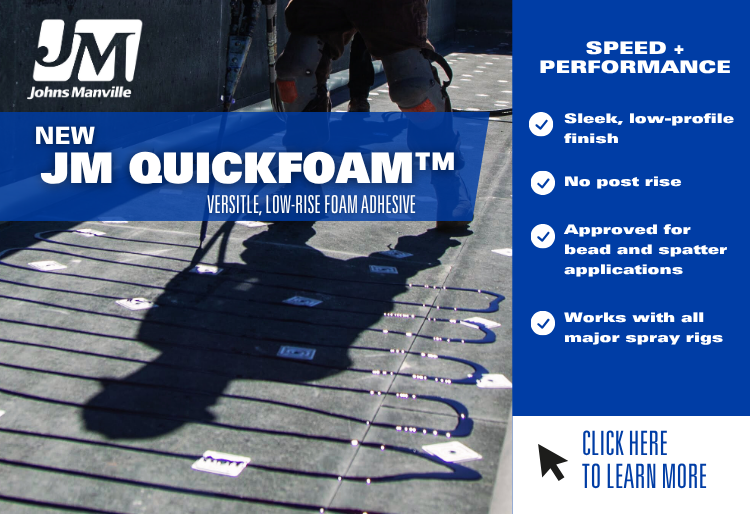



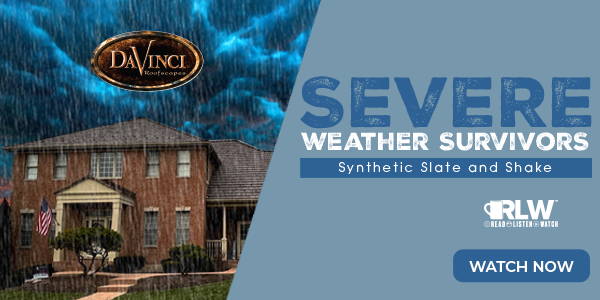
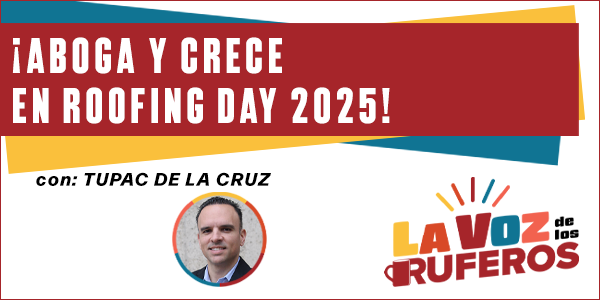
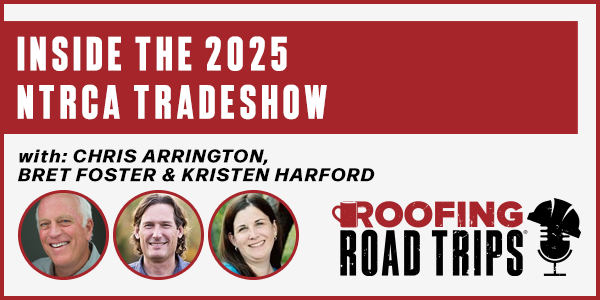
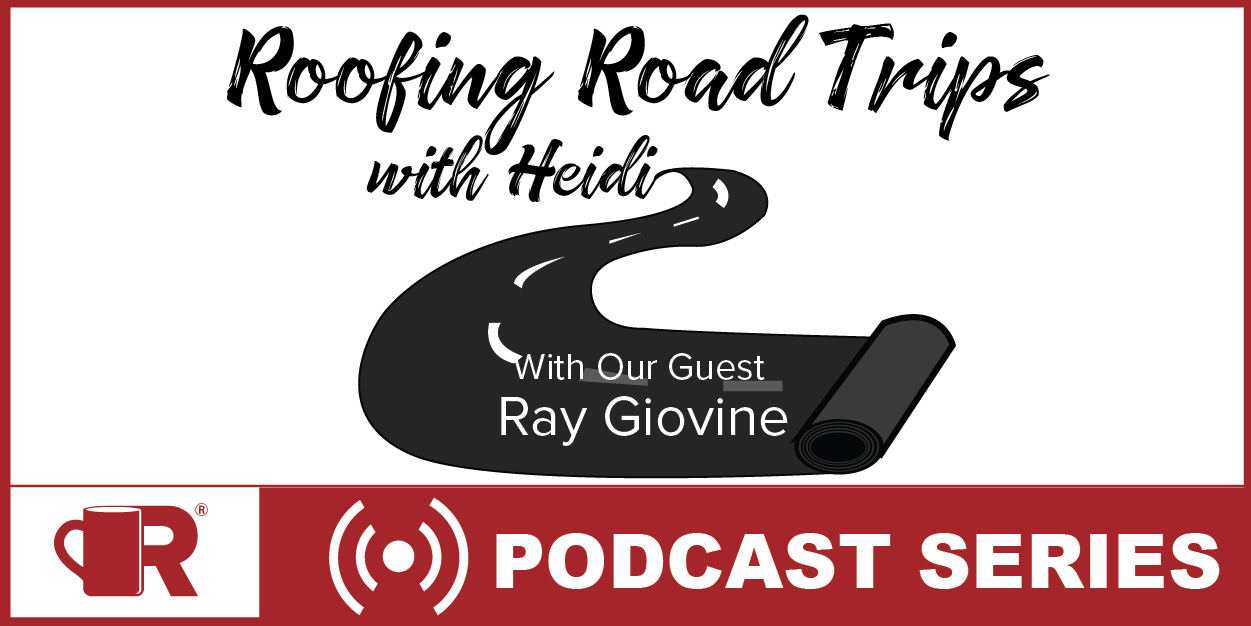




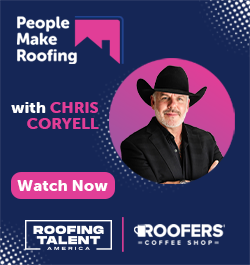
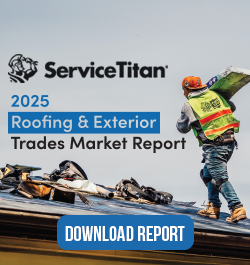
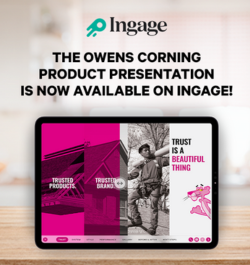
Comments
Leave a Reply
Have an account? Login to leave a comment!
Sign In